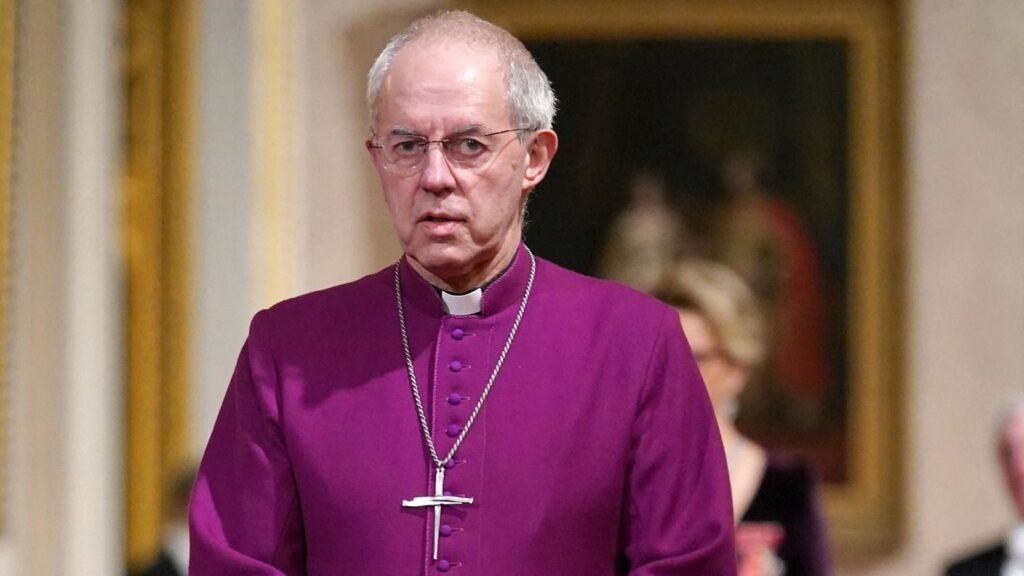Justin Welby: Acknowledging Mistakes in the Anglican Church’s Abuse Scandal

Introduction to the Anglican Church Scandal
The recent abuse scandal within the Anglican Church has marked a significant turning point in its storied history, revealing deep-seated issues that have plagued the institution for decades. Allegations of sexual abuse have emerged, implicating various members of the clergy and drawing attention to the church’s handling—or mishandling—of such serious allegations. This scandal is not an isolated event but rather part of a broader context of abuse within religious organizations, wherein the quest for reform and accountability is ongoing.
Historically, numerous reports indicated a pattern of silence and cover-up regarding instances of abuse within the church, leading to widespread mistrust among parishioners. The lack of responsiveness from church authorities in addressing these allegations has tarnished the reputation of the Anglican Church, once viewed as a moral compass within the community. The delayed acknowledgment of these allegations speaks to a systemic issue that has hindered institutional accountability and transparency. As a result, many victims have experienced prolonged suffering, leading to a tragic loss of faith among the followers.
In the midst of this turmoil, Justin Welby, the current Archbishop of Canterbury, has stepped forward as a pivotal figure tasked with addressing these scandals. His leadership is crucial, as the church grapples with the fallout of these allegations. Welby has been vocal about the necessity for the Anglican Church to confront its past mistakes and build a safer environment for its congregants. With calls for reform echoing throughout the church, Welby’s role not only involves acknowledging the failures of the institution but also implementing measures to ensure accountability and prevent future abuses. This blog post will delve deeper into the intricacies of the scandal, examining its implications for the church and its followers, and explore the critical responses that have emerged in the wake of these revelations.
Justin Welby’s Journey to Archbishops of Canterbury
Justin Welby became the 105th Archbishop of Canterbury in 2013, stepping into a role steeped in historical and spiritual significance within the Anglican Communion. His journey to this prominent position was marked by a diverse career path, which included roles in business and as a clergy member. Before his appointment, he served as the Bishop of Durham, where he garnered attention for his focus on reconciliation and social justice, shaping his leadership style towards compassion and inclusivity.
In his capacity as the Archbishop of Canterbury, Welby is responsible for leading the Church of England and providing spiritual oversight to the broader Anglican community. His role encompasses not only traditional ecclesiastical functions but also a significant public presence, engaging with a wide array of societal issues, including those of moral and ethical concern. He has made considerable efforts to address topics such as poverty, climate change, and human rights, reflecting a commitment to making the church relevant in contemporary society.
Central to Welby’s leadership approach is a willingness to confront difficult issues, particularly in light of growing scrutiny regarding the church’s handling of misconduct and abuse allegations. Since his installation, the Archbishop has sought to foster transparency and accountability within the Church, recognizing that addressing these issues is critical for restoring trust with congregations and the wider public. This commitment is evident in various church initiatives aimed at safeguarding and preventing future abuse within its institutions.
Through his tenure, Welby has emphasized the importance of healing and reconciliation, acknowledging the Church’s failures in the past. His forthrightness about the Church’s shortcomings has set the stage for a broader dialogue on how the Anglican Church can move forward and ensure that the lessons learned from its history shape a safer environment for all its members.
The Admission: ‘I Got It Wrong’
In a significant moment of reflection, Justin Welby, the Archbishop of Canterbury, publicly admitted, “I got it wrong,” regarding his handling of the Anglican Church’s abuse scandal. This profound statement was not merely a reflection of personal admission; it represented an acknowledgment of the systemic failures within the church’s leadership in addressing allegations of abuse. The context of Welby’s remarks came during a recent interview, where he faced scrutiny over the church’s response to historic cases of misconduct that have marred its reputation and affected countless victims.
Welby’s admission sheds light on a broader issue of accountability and transparency within church governance. In an institution as venerable as the Anglican Church, admission of error, particularly regarding such sensitive issues, rarely occurs. By recognizing his shortcomings, Welby not only took responsibility for his actions but also urged other leaders to embrace similar accountability. His statement reflects an essential step that many believe is necessary for fostering trust and healing among congregations and communities affected by these scandals.
The implications of his admission extend beyond personal accountability; they carry significant weight for the Anglican Church as a whole. Within the fabric of church leadership, such honesty can pave the way for a culture of sincerity, where difficult conversations about abuse and its impact are not avoided, but addressed head-on. This change can lead to meaningful reforms in policies and practices that aim to prevent future occurrences of abuse. Through his remarks, Welby has exemplified the critical need for church leaders to act with integrity, reinforcing the belief that acknowledging errors is vital for growth and transformation within the church, ultimately fostering a safer environment for all.
Reactions to Welby’s Admission
The admission of mistakes by Justin Welby, the Archbishop of Canterbury, regarding the Anglican Church’s handling of abuse cases has elicited a wide range of reactions from stakeholders, including abuse victims, church members, advocacy groups, and the general public. Many abuse victims have expressed cautious optimism regarding Welby’s acknowledgment of past missteps, viewing it as a necessary step towards healing and transparency within the church. These individuals emphasize the importance of accountability and hope that such admissions will lead to more comprehensive measures to prevent future abuses and support survivors.
Conversely, some church members have reacted with skepticism, questioning whether Welby’s admissions will translate into meaningful change. They argue that while acknowledging mistakes is important, it must be accompanied by concrete actions that address systemic issues within the church hierarchy. The perception, among this group, is that mere admissions do not suffice; genuine commitment to reform is expected if the Anglican Church intends to regain trust from its congregation and the wider community.
Advocacy groups focused on abuse prevention and victim support have largely welcomed Welby’s candid acknowledgment as a pivotal moment for the Anglican Church. Organizations such as the Survivors Network of those Abused by Priests (SNAP) have highlighted the significance of this admission, asserting that it marks a crucial milestone in the broader movement for transparency and accountability among religious institutions. They argue that such statements can create a conducive environment for dialogue and reform, pressing institutions to adopt stricter protocols regarding abuse allegations.
Overall, public sentiment reflects a growing demand for accountability within religious institutions. Many individuals now believe that leaders must confront past failings openly. This shift indicates a societal push for transparency that may ultimately lead to lasting change within the Anglican Church and beyond.
Impact on the Anglican Church’s Policies
The recent admissions by Justin Welby regarding the Anglican Church’s mishandling of abuse allegations have triggered a critical reflection on existing policies and protocols within the institution. This introspection opens the door for significant reforms aimed at enhancing safeguarding measures and addressing historical mistakes. The acknowledgment of failures is a pivotal step in restoring confidence among church members and the broader community.
In light of these admissions, there is a growing consensus on the necessity for a comprehensive review of the church’s approach to allegations of abuse. Recommendations from various stakeholders suggest that the Anglican Church should adopt a more transparent and accountable process for handling reports of sexual misconduct. This includes implementing standard protocols that ensure all allegations are thoroughly investigated and that victims are treated with dignity and respect.
Moreover, the need for regular training and education for clergy and staff on safeguarding issues cannot be overstated. By cultivating a culture of awareness, the Anglican Church can reduce the risk of abuse and create a safer environment for all congregants. This training should also emphasize the importance of listening to and supporting victims, reflecting a commitment to prioritizing their well-being throughout the reporting process.
As the church formulates its response to these challenges, it is equally crucial to establish mechanisms for accountability within church hierarchies. Implementing independent oversight bodies or commissions can serve as a check on power dynamics that may hinder justice for victims. These bodies should operate with transparency and be equipped to make recommendations that could lead to far-reaching changes in the church’s structures.
Through these proposed reforms, the Anglican Church can embark on a path toward healing and reconciliation, reaffirming its commitment to safeguarding its community and preventing future harm. Only by addressing these systemic issues can the church hope to regain the trust of its followers and rebuild its reputation in society.
The Role of Leadership in Addressing Abuse Scandals
The recent acknowledgment by Justin Welby regarding the Anglican Church’s abuse scandal signifies a pivotal moment in terms of leadership accountability within religious organizations. This admission not only reflects the complexities surrounding allegations of abuse but also underscores the critical responsibilities church leaders bear in fostering transparency and integrity within their communities. Leaders in religious institutions must recognize that their roles extend beyond merely guiding spiritual practices; they are tasked with safeguarding the well-being of congregants and maintaining public trust.
Effective leadership is crucial in addressing allegations of abuse. Swift and decisive action is necessary when such allegations surface. It is incumbent upon leaders to implement robust mechanisms for reporting and investigating complaints effectively. This includes training staff on recognizing signs of abuse and creating accessible channels through which congregants can voice concerns. By taking such measures, religious leaders demonstrate their commitment to a culture of accountability and safety, ultimately fostering an environment where victims feel supported and heard.
Moreover, the leadership within religious organizations must engage in continual education on the sensitivity surrounding abuse issues. This includes understanding the psychological impact of abuse on victims and how to approach allegations non-defensively and empathetically. Creating a safe environment is not just about responding to incidents but also about proactive measures that prevent abuse from occurring in the first place. This entails developing comprehensive policies, conducting regular reviews, and promoting open discussions about the prevention of abuse.
In conclusion, the implications of Welby’s admission extend beyond the Anglican Church; they serve as a call to action for leaders across all religious organizations. Responsibility in leadership involves a commitment to continuous improvement in policies and practices that safeguard members against abuse, thus ensuring a safer and more accountable community. Such an approach is imperative for restoring trust and ensuring that victims of abuse receive the support they deserve.
Comparative Analysis with Other Faiths
The handling of abuse scandals within religious organizations often reflects the systemic issues present in those faiths. A comparative examination reveals a spectrum of responses among various religious groups, with some exhibiting more robust strategies for accountability and reform than others. In the case of the Roman Catholic Church, for instance, there has been widespread criticism regarding the initial responses of church leaders, who were often seen as prioritizing the institution’s reputation over the victims’ needs. However, in recent years, steps have been taken to address past failures, such as the establishment of protocols for reporting abuse and the implementation of training programs aimed at preventing further occurrences. These efforts, although not without their own challenges, indicate an evolving understanding of the importance of transparency and accountability.
Similarly, within the Jewish community, the Orthodox Union and other organizations have acknowledged the need for reform in addressing sexual abuse. In recent years, they have introduced educational initiatives, reporting hotlines, and frameworks aimed at victim support. Their responses emphasize the importance of community engagement and the necessity of fostering an environment where victims feel safe to come forward. The proactive stance taken by some Jewish leaders contrasts with more traditional responses observed in the Anglican Church, where critiques have pointed to hesitations in confronting systemic abuse issues directly.
In the context of Islam, the responses to abuse scandals have been diverse. Some Islamic organizations have launched significant campaigns focused on educational outreach and community awareness about abuse. This has often been paired with strict denunciations of perpetrators, underscoring the faith’s commitment to justice for victims. However, the degree of response often varies between cultural contexts, with certain communities moving quicker toward reform than others.
This comparative analysis of various faiths reveals patterns in leadership responses and reform measures. Understanding these frameworks can illuminate the path forward for the Anglican Church. The key takeaway from these diverse experiences is the importance of transparency, accountability, and a victim-centered approach in the pursuit of justice.
The Path Forward: Healing and Rebuilding Trust
In the aftermath of the Anglican Church’s abuse scandal, it is crucial to focus on the steps necessary for healing and rebuilding trust within the community. The significance of engaging in open and honest dialogue cannot be understated. This dialogue must include not only church leadership and internal committees but also survivors of abuse and their families. By fostering an environment where victims can share their experiences and feelings, the church can begin to understand the profound impact of these failures and take meaningful measures to prevent recurrence.
Establishing robust support systems for victims is another essential component of the healing process. The Anglican Church must prioritize the development of resources that provide psychological, emotional, and spiritual support to those affected. This could mean creating counseling services led by professionals experienced in trauma recovery, developing peer support groups, or providing pastoral care tailored to the needs of survivors. Such initiatives demonstrate a commitment to acknowledging the past and responding with compassion and empathy, thus encouraging others within the community to come forward.
Rebuilding trust also necessitates transparency and the implementation of genuine reform efforts. It is imperative that the church takes concrete steps to address past grievances effectively. This can involve independent investigations into allegations of abuse and publicly sharing the findings with the community. Additionally, restoring faith in the institution will require establishing clear protocols for reporting and addressing future allegations, thereby reassuring congregants that their safety is the top priority.
In light of the weight of these responsibilities, the Anglican Church must commit to a path forward that embraces reform, compassion, and a renewed focus on accountability. Through these efforts, the church not only recognizes its past mistakes but also works diligently to rectify them and create a safer, more trustworthy environment for all members of the community.
Conclusion: A Call for Reflection and Action
The revelations regarding the Anglican Church’s handling of abuse cases highlight a critical need for reflection and action, not only within religious institutions but also across various organizations facing similar crises. As leaders like Justin Welby strive to address the harm caused, it becomes evident that transparency and accountability are essential for rebuilding trust. Acknowledging mistakes is a fundamental first step towards healing, and it calls upon all institutions to engage in introspective evaluation of their practices.
Institutions must prioritize the protection of vulnerable individuals, which requires a commitment to honest dialogue about past failures and present obligations. The challenge of addressing abuse is a complex one that transcends denominations and institutional types. It is imperative that organizations, regardless of their nature, reflect on their policies and responses to allegations of abuse. By implementing robust safeguarding measures and promoting a culture of openness, institutions can foster environments where individuals feel safe to speak out without fear of retribution.
Moreover, a collective commitment to continuous improvement can catalyze transformative change within institutions. Establishing clear pathways for reporting abuses and ensuring that these channels are accessible to all can enhance accountability. Additionally, investing in training programs focused on recognizing and responding to abuse will empower staff and leadership alike. As we move forward, it is crucial to understand that the journey towards institutional integrity is ongoing, and that the lessons learned from past mistakes must inform future actions.
In conclusion, the ongoing dialogue surrounding the Anglican Church’s response to abuse cases serves as a significant reminder of the importance of vigilance, reflection, and decisive action across all institutions. By holding themselves accountable and prioritizing the welfare of vulnerable individuals, organizations can begin the process of restoring trust and preventing further harm. The path ahead requires unwavering commitment and shared responsibility to ensure that past wrongs do not define the future.










Leave a Reply
You must be logged in to post a comment.